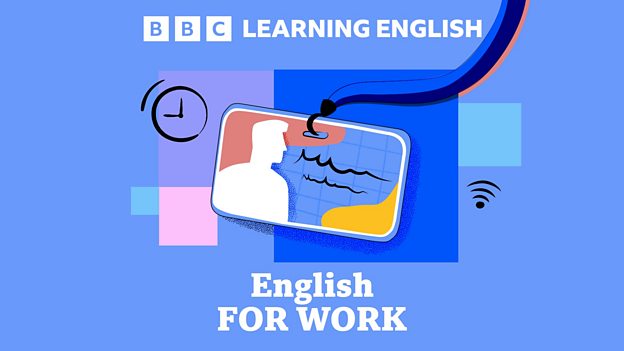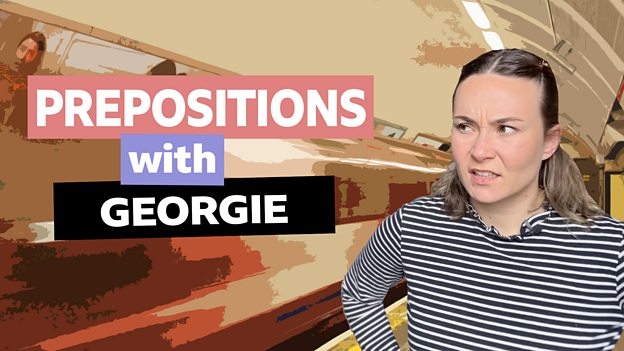6 Minute English
Intermediate level
Confused by modern idioms?
Episode 220728 / 28 Jul 2022

- Which are most dangerous: Humans or sharks?
- Climate change and animal evolution
- Preserving traditional recipes
Introduction
Language changes fast, and new words and phrases are being created all the time. In this programme, Rob and Sam talk about some modern idioms – new expressions that have been introduced to English through the internet, TV and social media.
This week's question
Many well-known idioms come from the world of sport, for example ‘throw in the towel’ which means ‘give up’, or ‘surrender’. But which sport does the idiom ‘throw in the towel’ come from?
a) football
b) tennis
c) boxing
Listen to the programme to find out the answer.
Vocabulary
spend a penny
(old-fashioned idiom) go to the toilet
thrown in the towel
(idiom) give in; surrender; stop doing something because you realise you cannot succeed
Groundhog Day
(idiom) a situation in which events that have happened before, happen again in exactly the same way
ubiquitous
seeming to appear everywhere
break the internet
(idiom) cause so much excitement about something online that many people visit the website, making it crash
first-world problem
(idiom) a problem that does not seem very important when compared to the serious problems faced by people in poorer parts of the world
Transcript
Note: This is not a word-for-word transcript.
Rob
Hello. This is 6 Minute English from BBC Learning English. I’m Rob.
Sam
And I’m Sam. Can you wait a second, Rob? I have to spend a penny.
Rob
What! You’re going shopping now, are you? We’re just about to start the programme!
Sam
No, no, I have to… you know, ‘spend a penny’. Haven’t you heard that expression before? Spend a penny means ‘go to the toilet’. It’s an old idiom from the days when it cost a penny to unlock the door of a public toilet.
Rob
OK, I see. Well, you’re showing your age there, Sam – most young people today wouldn’t know what that phrase meant, and there aren’t many public toilets left nowadays anyway.
Sam
Language changes fast, and new words and phrases are being created all the time. In this programme, we’ll be learning some modern idioms – new expressions that have been introduced to English through the internet, TV and social media. And of course, we’ll be learning their meanings a well.
Rob
Great, I’m ‘raring to go’ – another idiom there. But first, as usual, I have a question for you, Sam. Many well-known idioms come from the world of sport, for example ‘throw in the towel’ which means ‘give up’, or ‘surrender’. But which sport does the idiom ‘throw in the towel’ come from? Is it:
a) football?
b) tennis? or
c) boxing?
Sam
I think I know this one. It’s c) boxing.
Rob
OK, Sam. I’ll reveal the answer at the end of the programme, so just hold your horses for now!
Sam
Ah, another idiom there, Rob - hold your horses meaning ‘stop and think for a moment’. That’s an idiom that Gareth Carrol might teach his university students. Dr Carrol is the author of a new book, ‘Dropping the Mic and Jumping the Shark: Where Do Modern Idioms Come From?’ He became interested in idioms when he realised that he didn’t know many of the expressions his students used in their everyday speech, modern idioms like ‘jump the shark’.
Rob
Here is Gareth Carrol telling BBC Radio 4 programme, Word of Mouth, about one source of many modern idioms – the movies.
Dr Gareth Carrol
So, Groundhog Day I think more or less has the meaning of ‘déjà vu’ now, and it’s completely embedded in the language… actually, that’s probably one of the first phrases that got me thinking about these modern idioms in the first place because it is so ubiquitous, it’s used in a huge range of contexts, and one of the things that made me sit up and take notice is, I had a number of students who know the phrase, Groundhog Day, but had no idea it was a film.
Sam
In the film, Groundhog Day, the main character wakes up to live the same day over and over again. Gradually, the movie title itself became an idiom, Groundhog Day, meaning a situation in which events that have happened before, happen again in exactly the same way. It’s similar in meaning to another expression – déjà vu.
Rob
When phrases the movies develop into idioms it’s often because they are ubiquitous – they seem to appear everywhere.
Sam
And one of the ways they appear everywhere is, of course, the internet. Here’s Gareth Carrol again, telling more to Michael Rosen, presenter of BBC Radio 4 programme, Word of Mouth:
Dr Gareth Carrol
The vocabulary of the internet, even the word ‘internet’, is relatively modern… the idea of breaking the internet is now a phrase I think people would use and recognise, so something that causes such a stir online that metaphorically so many people rush to a website that it threatens to bring it down, something like that…
Michael Rosen
In the early days we had ‘go viral’ which has stayed with us, hasn’t it?
Dr Gareth Carrol
Yeah, so the idea of something going viral is certainly very much in the vocabulary now… But things like Twitter have leant sort of phrases, so the idea of first-world problems, meaning sort of ironically things that we complain about but actually, compared to other parts of the world, may well be relatively minor, that started life as Twitter hashtag, for example.
Rob
Another modern idiom is breaking the internet – causing so much excitement about something online that too many people visit the website at the same time, making it crash.
Sam
Social media outlets like Twitter have also created their own idioms, including first-world problems - a trivial problem that does not seem very important when compared to the serious problems faced by people in poorer parts of the world.
Rob
If you don’t know some of these idioms, don’t worry. Unlike general vocabulary, a native speaker’s full knowledge of idioms takes longer to develop, usually at around the age of thirty to forty.
Sam
Meanwhile, you can still rely on classic English idioms, like ‘pull my leg’, ‘kick the bucket’, and ‘throw in the towel’ – which, I think, comes from the sport of boxing. Rob?
Rob
Yes, in my question I asked which sport gave birth to the phrase ‘throw in the towel’, and Sam’s answer was correct! Well done! The idiom ‘throw in the towel’ comes from boxing where the coach of losing boxer would literally throw a towel into the ring to surrender.
Sam
OK, let’s recap the rest of the idioms, old and new, that we’ve learnt today. To spend a penny is an old-fashioned way of saying ‘go to the toilet’.
Rob
Groundhog Day describes a situation in which events that have happened before, happen again exactly the same way.
Sam
If something is ubiquitous, it seems to appear everywhere.
Rob
The modern idiom break the internet, means to cause so much excitement about something online that you make the website crash.
Sam
And finally, a first-world problem is a problem that does not seem very important when compared to the serious problems faced by people in poorer parts of the world. Unfortunately for us, our six minutes are up! Bye for now!
Rob
Bye bye!
Latest 6 Minute English

United against food waste
Episode 221229 / 16 Dec 2022
According to the UN, one third of the food we grow ends up in the rubbish bin - how can we stop this?

3D printers
Episode 221222 / 16 Dec 2022
How are 3D printers providing solutions to some of our medical problems?


Deep-sea mining: Good or bad for the planet?
Episode 221208 / 29 Nov 2022
Learn about an idea to deal with climate change that could affect marine ecosystems.

Can music mend a broken heart?
Episode 221201 / 24 Nov 2022
Is music really a cure for a broken heart?

The art of conversation
Episode 221124 / 24 Nov 2022
We discuss whether the art of conversation is being lost in the era of social media

Qatar's World Cup workers
Episode 221117 / 17 Nov 2022
Hear about the workers who built the World Cup stadiums

Controlling the weather
Episode 221110 / 10 Nov 2022
How people are trying to manipulate the weather


Are Halloween costumes too scary?
Episode 221027 / 25 Oct 2022
We discuss whether Halloween costumes are now too scary to be fun.

Does climate change make you anxious?
Episode 221020 / 20 Oct 2022
We discuss how extreme weather events are affecting our mental health.


Are artistic brains different?
Episode 221006 / 06 Oct 2022
We talk about Mozart, Jimi Hendrix and teach you vocabulary.


English for dating online
Episode 220922 / 22 Sep 2022
We discuss the language used for online dating

Man vs beast: Who is more efficient?
Episode 220915 / 15 Sep 2022
We discuss the advantages of the design of the human body

Are you following your dreams?
Episode 220908 / 08 Sep 2022
Hear the inspiring story of people who are doing it

Do emojis make language better?
Episode 220901 / 01 Sep 2022
Are emojis turning us into lazy writers?

Being a beauty influencer
Episode 220825 / 25 Aug 2022
Hear about women who are using social media to change attitudes to beauty

Women in the workplace
Episode 220818 / 18 Aug 2022
Hear about the career-killing tasks that are holding women back in the workplace


How pandemics end
Episode 220804 / 04 Aug 2022
We talk about previous periods in which deadly diseases went global

Confused by modern idioms?
Episode 220728 / 28 Jul 2022
Having a Groundhog Day? Keen to break the internet? Learn some modern idioms.

Which are more dangerous: sharks or humans?
Episode 220721 / 21 Jul 2022
How sharks have become an endangered species.

Climate change and animal evolution
Episode 220714 / 14 Jul 2022
Can today's animals evolve quickly enough to survive a changing climate?

Preserving traditional recipes
Episode 220707 / 07 Jul 2022
Missing your mother's cooking? We talk about traditional dishes.

Restoring trust in science
Episode 220630 / 30 Jun 2022
Astronomer Neil deGrasse Tyson's quest to highlight the difference between opinion and fact

The Manhattan Project
Episode 220623 / 23 Jun 2022
In this episode, we discuss the events leading to the creation of the first atomic bomb.

Island life: Is it paradise?
Episode 220616 / 16 Jun 2022
What is life really like in the Pacific islands?

The technology of translation
Episode 220609 / 31 May 2022
What is the relationship between translation, technology and the human brain?

Queen Elizabeth II: What is the Platinum Jubilee?
Episode 220602 / 02 Jun 2022
We talk about a very British tradition



Can VR treat fears and phobias?
Episode 220512 / 12 May 2022
Hear how tech is helping people change their behaviour for the better


Remembering Desmond Tutu
Episode 220428 / 28 Apr 2022
Deep convictions and a sense of humour - we talk about a man who helped end apartheid in South Africa.

Discoveries of the Deep Sea
Episode 220421 / 21 Apr 2022
We talk about an extreme environment which is stranger than fiction

Rhetoric: How persuasive are you?
Episode 220414 / 14 Apr 2022
We talk about an art that started with ancient Greek philosophers

Britain's love affair with coffee
Episode 220407 / 07 Apr 2022
It's not all about tea. Britons love coffee too!

Optimists vs Pessimists
Episode 220331 / 11 Mar 2022
Listen to a conversation about optimists and pessimists

The world of Agatha Christie
Episode 220324 / 24 Mar 2022
Hear a chat about the queen of murder mystery, who had her books translated into over 100 languages


Why laughter is the best medicine
Episode 220310 / 10 Mar 2022
Shouldn't we take laughter more seriously?

Is being kind good for you?
Episode 220303 / 03 Mar 2022
Listen to what scientists are saying about the benefits of giving others a helping hand

Eating bugs
Episode 220224 / 24 Feb 2022
Would you eat a cricket? How about a portion of nice crunchy ants?


Do our pets care about us?
Episode 220210 / 10 Feb 2022
We wonder what all that licking is really all about

Sleepy in South Korea
Episode 220203 / 03 Feb 2022
Life in a place where people work, study longer hours and get less sleep than anywhere else

Preparing for the Beijing Winter Olympics
Episode 220127 / 27 Jan 2022
Artificial snow, coronavirus and controversy surround the Beijing Games starting soon.

Are personalised diets the best way to be healthy?
Episode 220120 / 20 Jan 2022
Learn how microbes help digest food and have an impact in our bodies.









